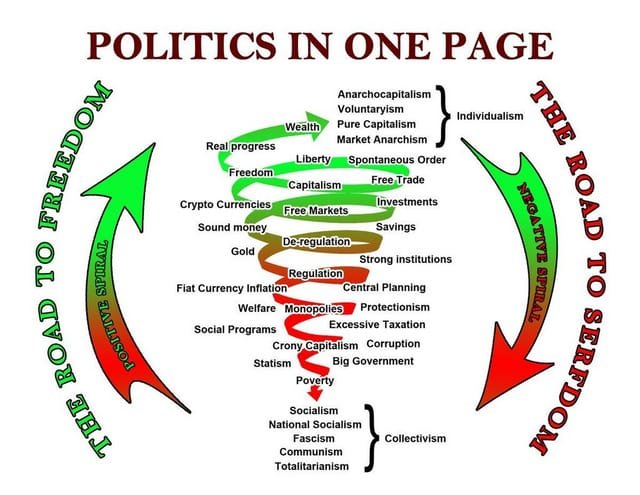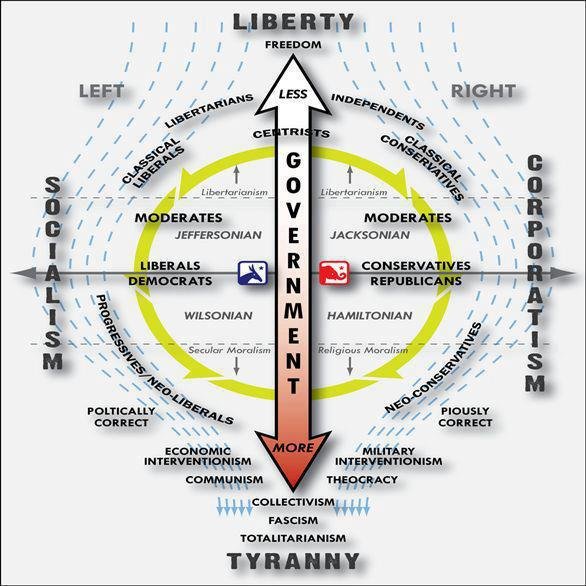Dear Hiveans,
in political disputes some people regularly use the word "fascist" to demean their enemy - without knowing what they are talking about. Thus, I want to derive the meaning of "fascism" by means of its etymology, because words matter.
The word "fascism" is derived from the Italian word "fascismo" (from fascio (“fasces, bundle, group”) + -ismo (“-ism”)). Fascio (wiki) means literally "a bundle" or "a sheaf",
In ancient Rome, the fasces was a physical bundle of straight wooden rods, surrounding an axe (its blade sticking out from the top). There are 2 important allegories (wiki) within the image of "fasces":
- the bundle of wooden rods symbolizes that many people (=rods) are bound or tied together (be it voluntary or unvoluntary) and are equally aligned and in unity.
- the axe symbolizes force and the public officials' or dictator's ultimate authority, law-giving status, and the power of capital punishment. (source 1, source 2, source 3, source 4)

So, overall the fasces is a symbol for unity and governmental, central power (force).
Applying the symbol of "fasces" to the political term "fascism", I would make 2 conclusions:
- The more people are (forcefully) tied together and the more powers are transferred from individuals to government/a dictator, the more fascist a society is.
- The content or the thematic profile of this government (be it nationalist, socialist, religiously fundamentalist or environmentalist) plays a subordinate role.
As all societies today are organized within states and have a certain level of centralization of power and force, each and every country has a certain dosage of fascism. But as we know, "the dose makes the poison" (wiki).
From a philosophical point of view, there is only one philosophy that contains no degree of fascism at all, and that is anarchy (the absence of rule/force) (I wrote about anarchy here).
Starting from the point of no force (anarchy) there is a continuum of levels of fascism. Ordering states from less fascist to more fascist, I would for example say:
Switzerland (little central power, high degree of federalism/subsidiarity (wiki)) / Singapore --> Canada / Sweden --> USA --> UK / France / Germany --> China / Putin's Russia --> North Korea.
What do you think of this etymological approach towards the meaning of fascism? What experiences have you made with fascism? How would you order countries?
Have a great week,
zuerich
P.S. 2 schemes trying to depict different political directions. From bottom (maximum fascism) to top (freedom/individualism/anarchy).

Liebe Hiver,
in politischen Auseinandersetzungen benutzen manche Leute regelmäßig das Wort "Faschist", um ihren Gegner zu verunglimpfen - ohne zu wissen, wovon sie reden. Deshalb möchte ich mich mit der Etymologie und der Bedeutung des Wortes "Faschismus" auseinandersetzen, denn "words matter".
Das Wort "Faschismus" ist vom italienischen Wort "fascismo" abgeleitet (von fascio ("fasces, Bündel, Gruppe") + -ismo ("-ismus")). Fascio (wiki) bedeutet wörtlich "ein Bündel" oder "eine Garbe",
Im alten Rom war die "fasces" ein physisches Bündel aus geraden Holzstäben, die eine Axt (deren Klinge oben herausragt) umgaben. Es gibt 2 wichtige Allegorien (wiki) innerhalb des Bildes der "fasces":
- Das Bündel von Holzstäben symbolisiert, dass viele Menschen (=Stäbe) zusammengebunden sind (sei es freiwillig oder unfreiwillig) und gleich ausgerichtet und in Einheit sind.
- Die Axt symbolisiert Gewalt und die höchste Autorität der Regierung oder des Diktators, den Status des Gesetzgebers und die Macht zur Ausübung der Todesstrafe. (Quelle 1, Q 2, Q 3, Q 4)

Insgesamt ist die "fasces" also ein Symbol für Einheit und staatliche, zentrale Macht (Gewalt). Wendet man das Symbol der "fasces" auf den politischen Begriff "Faschismus" an, würde ich 2 Schlussfolgerungen ziehen:
- Je mehr Menschen (gewaltsam) aneinander gebunden sind und je mehr Macht vom Einzelnen auf den Staat/Diktator übertragen wird, desto faschistischer ist eine Gesellschaft.
- Der Inhalt oder das thematische Profil dieser Regierung (sei sie nationalistisch, sozialistisch, religiös-fundamentalistisch oder environmentalist) spielt eine untergeordnete Rolle.
Da alle Gesellschaften heute innerhalb von Staaten organisiert sind und ein gewisses Maß an Zentralisierung von Macht und Gewalt aufweisen, gibt es in jedem Land eine gewisse Dosis Faschismus. Aber wie wir wissen, "die Dosis macht das Gift" (wiki).
Aus philosophischer Sicht gibt es nur eine Philosophie, die überhaupt kein Maß an Faschismus enthält, und das ist die Anarchie (die Abwesenheit von Herrschaft/Gewalt) (ich habe über Anarchie hier geschrieben).
Ausgehend vom Punkt der Abwesenheit von Gewalt (Anarchie) gibt es ein Kontinuum von Faschismus. Wenn man die Staaten von weniger zu mehr faschistisch ordnet, würde ich zum Beispiel sagen:
Schweiz (wenig Zentralgewalt, hoher Grad an Föderalismus/Subsidiarität (wiki) / Singapur --> Kanada / Schweden --> USA --> Großbritannien / Frankreich / Deutschland --> China / Putins Russland --> Nordkorea.
Was haltet Ihr von diesem etymologischen Ansatz zur Begriffsklärung des Faschismus? Welche Erfahrungen habt Ihr mit Faschismus gemacht? Wie würdet Ihr die Länder ordnen?
Have a great week,
zuerich
P.S. 2 Schemata, die versuchen, verschiedene politische Richtungen einzuordnen. Von unten (maximaler Faschismus) nach oben (Freiheit/Individualismus/Anarchie).

Queridos Hiveanos,
en las disputas políticas, algunas personas utilizan regularmente la palabra "fascista" para degradar a su enemigo, sin saber de qué están hablando. Por ello, quiero profundizar en la etimología y el significado de "fascismo", porque las palabras importan.
La palabra "fascismo" deriva de la palabra italiana "fascismo" (de fascio ("fasces, haz, grupo") + -ismo ("-ismo")). Fascio (wiki) significa literalmente "un haz" o "una gavilla",
En la antigua Roma, la fasces era un haz físico de varas de madera rectas, que rodeaba un hacha (su hoja sobresalía de la parte superior). Hay dos alegorías importantes (wiki) dentro de la imagen de las "fasces":
- el haz de varas de madera simboliza que muchas personas (=varas) están unidas o atadas (ya sea de forma voluntaria o no) y están igualmente alineadas y en unidad.
- el hacha simboliza la fuerza y la máxima autoridad de los funcionarios públicos o del dictador, la condición de legislador y el poder de la pena capital. (fuente 1, fuente 2, fuente 3, fuente 4)

Así que, en general, las fasces son un símbolo de unidad y poder (fuerza) gubernamental y central.
Aplicando el símbolo de las "fasces" al término político "fascismo", yo sacaría 2 conclusiones:
- Cuanto más se ate a las personas (por la fuerza) y cuanto más se transfieran los poderes de los individuos al gobierno/dictador, más fascista es una sociedad.
- El contenido o el perfil temático de este gobierno (ya sea nacionalista, socialista, religiosamente fundamentalista o ecologista) juega un papel subordinado.
Como todas las sociedades actuales están organizadas en países y tienen un cierto nivel de centralización del poder y la fuerza, todos y cada uno de los países tienen una cierta dosis de fascismo. Pero como sabemos, "la dosis hace el veneno" (wiki).
Desde un punto de vista filosófico, sólo hay una filosofía que no contiene ningún grado de fascismo, y es la anarquía (la ausencia de regla/fuerza) (escribí sobre la anarquía aquí).
Partiendo del punto de ausencia de fuerza (anarquía) hay un continuo de niveles de fascismo. Ordenando los estados de menos a más fascistas, yo diría por ejemplo que
Suiza (poco poder central, alto grado de federalismo/subsidiariedad (wiki)) / Singapur --> Canadá / Suecia --> EEUU --> Reino Unido / Francia / Alemania --> China / Rusia de Putin --> Corea del Norte.
¿Qué opinas de esta aproximación etimológica al significado del fascismo? ¿Qué experiencias has tenido con el fascismo? ¿Cómo ordenarías los países?
Que tengáis una buena semana,
zuerich
P.D. 2 esquemas que intentan representar diferentes direcciones políticas. Desde abajo (máximo fascismo) hasta arriba (libertad/individualismo/anarquía).





Tolle Erklärung! Dieser Post ist echt super. Macht den Punkt sehr verständlich. Es braucht keine Korporationen oder Regierungen mehr. Diese archaische und versteifte tradition der Unterdrückung hat endlich seinen Wiedersacher gefunden. Der Dissident in form einer kompletten Änderung dieser rückständigen Denkweisen. Schon tiefgründig wenn man erst 79 Jahre nach den nazis erkennt in was für einem Asozialen system wir verankert sind ? So Much violence embedded in the etymological meaning. Very profound
Sometimes people use words not knowing the actual meaning thanks dear for sharing this
Das teile ich gerne weiter :-)
Dear @zuerich , I didn't know that the etymology of "fascism" was "fascismo".😦
It is difficult for an East Asian person like me to learn various European languages and sentences.
Thank you for article!
Was wenn Figuren wie Putin mittlerweile marktwirtschaftlicher als unsere eigene Elite handeln?
Dann wäre das eine Stufe nach oben, weg vom Faschismus. Das ist aber nicht der Fall, ganz im Gegenteil.
hmmmmm, very interesting. I must admit that I never even knew what that word meant and only have her of it used in a bad way.
very interesting, thanks for info GODBLESS you :)